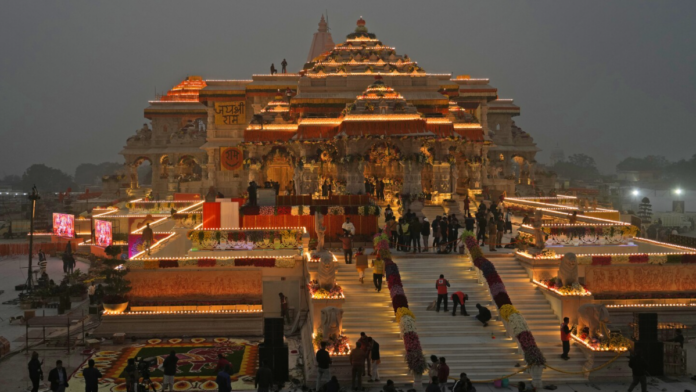Ram Mandir vs. Babri Masjid replicas are fueling a game of political one-upmanship in West Bengal’s Murshidabad district, where efforts to construct these structures have turned into a high-stakes contest. The region is witnessing communal and political tensions as two opposing projects—the replica of the Ayodhya Ram Temple and a smaller copy of the Babri Masjid—gather momentum.
Ram Mandir Replica: A Symbol of Unity or Divisive Politics?
The initiative to build a replica of the Ayodhya Ram Temple in Murshidabad is spearheaded by the Bongiyo Ram Sevak Parishad Charitable Trust, backed by local BJP leaders.
- Key Features of the Temple:
- The temple will replicate the Ayodhya Ram Mandir but will include idols reflecting Bengali culture, including those of Lord Ram, Lakshman, Sita, and Durga Maa.
- The bhoomi pujan (groundbreaking ceremony) is scheduled for January 22, 2025, exactly a year after the Ayodhya temple was consecrated.
- Around 28-30 bighas of land will be donated by villagers for the project, which is estimated to cost Rs. 10 crores.
BJP’s Stance:
- BJP leaders claim the temple will promote Bengali culture and counter narratives suggesting Ram is not a Bengali deity.
- Critics, however, argue this is a strategic attempt to consolidate Hindu votes in a Muslim-majority district.
Babri Masjid Copy: A Response to the Ram Mandir
In response, TMC MLA Humayun Kabir announced plans to build a replica of the Babri Masjid.
- Key Features of the Mosque:
- The mosque will be built on six bighas of land, with an adjoining hospital and guesthouse on another six bighas.
- The foundation stone is set to be laid on December 6, 2025, commemorating the day the original Babri Masjid was demolished in Ayodhya in 1992.
- Kabir has personally pledged Rs. 1 crore to fund the mosque and expects to complete the project by 2029.
Kabir’s initiative has drawn criticism from BJP leaders, who accuse him of celebrating a “foreign invader.”
Political and Communal Tensions in Murshidabad
Murshidabad, with a Muslim population of 66.27% (2011 Census), has a history of communal sensitivity. Recent clashes in Beldanga have intensified concerns about potential unrest.
- Internet Shutdown and Prohibitory Orders: Communal tensions in the district recently forced authorities to impose restrictions.
- BJP’s Narrative: Leaders are framing the Ram Mandir as a counterbalance to what they perceive as demographic changes in the region.
The TMC leadership, meanwhile, has distanced itself from Kabir’s mosque initiative, labeling it a personal project.
Temple Politics in Bengal: A Broader Context
The Ram Mandir-Babri Masjid clash is unfolding against a larger backdrop of temple politics in Bengal.
- TMC’s Jagannath Temple Project: Chief Minister Mamata Banerjee has expedited the construction of a Jagannath temple in Digha, signaling her party’s foray into religious symbolism.
- BJP’s Strategy: By promoting the Ram Mandir project, the BJP aims to counter TMC’s narrative and appeal to Hindu sentiments.
This battle for religious and cultural symbolism reflects the deepening political rivalry in the state.
Public Reactions and Controversy
The dual initiatives have sparked mixed reactions:
- Supporters of the Ram Mandir: BJP leaders and local Hindu groups argue the temple will preserve Bengali traditions and counter narratives undermining Lord Ram’s cultural relevance.
- Critics of the Mosque Project: BJP leaders view the Babri Masjid replica as an attempt to provoke communal disharmony.
- TMC’s Official Position: The party has cautiously distanced itself from the mosque project while accusing the BJP of divisive politics.
Cultural Significance vs. Political Agendas
Both projects claim to celebrate cultural and religious heritage, but critics argue they are politically motivated:
- Ram Mandir: Promoted as a unifying cultural landmark but viewed as a political tool to polarize voters.
- Babri Masjid: Framed as a tribute to a historic structure but criticized for its timing and perceived intent to counter the temple project.
The timing of the announcements, coinciding with upcoming elections, has fueled speculation about their true intent.
Funding and Feasibility
Both projects boast strong support from their respective communities:
- Ram Mandir: Villagers have pledged land and funds, and BJP leaders are confident about raising the required Rs. 10 crores.
- Babri Masjid: Donations are pouring in, with Kabir personally pledging Rs. 1 crore.
However, the feasibility of completing these ambitious projects remains uncertain.
A Flashpoint for Communal Harmony?
The competing projects have the potential to either foster cultural pride or exacerbate communal tensions:
- Potential Benefits: Both structures could attract tourism and serve as symbols of cultural preservation.
- Risks: The initiatives could deepen divisions and lead to unrest, especially in a communally sensitive district like Murshidabad.
The government and civil society must ensure that these projects do not become flashpoints for violence or discord.


